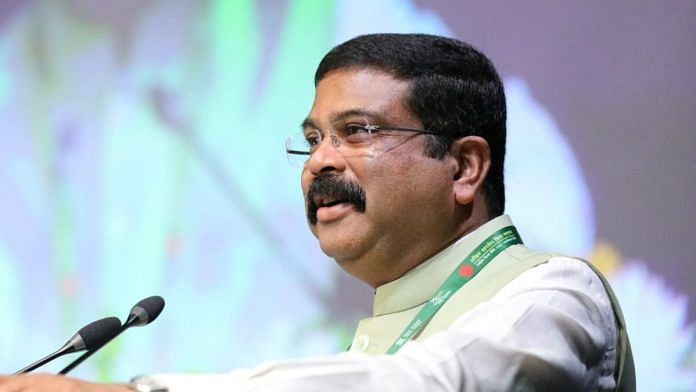New Delhi: Education Minister Dharmendra Pradhan said Saturday that the New Education Policy 2020 is aimed at “decolonising education and achieving aspirations, creating pride in our languages, culture and knowledge”.
“We must bring in a transformative education system rooted in Indian values, thoughts and sense of service,” he said at the end of a three-day conference — called the Akhil Bharatiya Shiksha Samagam — organised by his ministry at Varanasi.
A press note shared by the Ministry of Education said the Akhil Bharatiya Shiksha Samagam — attended by over 300 educators, academics and administrators from state and central universities, Indian Institutes of Technology, Indian Institutes of Management (IIMs) — saw discussions on how the central government’s National Education Policy 2020 should be implemented.
Announced in 2020, the new National Education Policy proposes an overhaul of the education system in India. It replaces the NEP 1986.
University Grants Chairman (UGC) Chairman M. Jagadesh Kumar said that “participants collectively took a pledge” to help “transform the Indian educational system by implementing NEP 2020”.
“All Indian languages will be given equal importance as all of them are our national languages. Efforts will be made to prepare textbooks and study materials in Indian languages,” he said.
Also Read: To learn ‘best practices’, govt curriculum panel meets Ramakrishna Mission, Alim Madrasah, others
Promoting Indian languages
A key focus area of the conference was promoting Indian Knowledge Systems (IKS) — that is, promoting “the rich cultural heritage, art, and languages of India”, the press note said.
Currently, All India Council for Technical Education (AICTE) has an active IKS cell, which works on projects that have an Indian theme, the press note said.
A panel discussion on ‘Promotion of Indian Languages and Indian Knowledge Systems’ — chaired by. Prof. Chamu Krishna Shastri, who is working for Promotion of Indian Languages — discussed a “multipronged approach” will be needed to rejuvenate IKS.
The idea is now to develop more such IKS cells across education institutions that can work on ancient Indian knowledge, the press note said. For this, students will have to undertake more research in subjects that are part of IKS, the press note said.
There should be “authentic verified references, course materials, and textbooks essential for developing several courses that are discipline specific and are aligned with the interests and needs of the students,” the press note said.
It added that there is a need to “establish IKS centres in various institutions across the country to develop institutional capacity to support the research, education, mentoring, and outreach activities”.
The other sessions at the conference discussed other policies mentioned in NEP 202, such as academic bank of credits, multiple entry-exit and skill development.
(Edited by Uttara Ramaswamy)
Also Read: Haryana, Karnataka, Gujarat — BJP states make school textbook changes & reignite old debate



